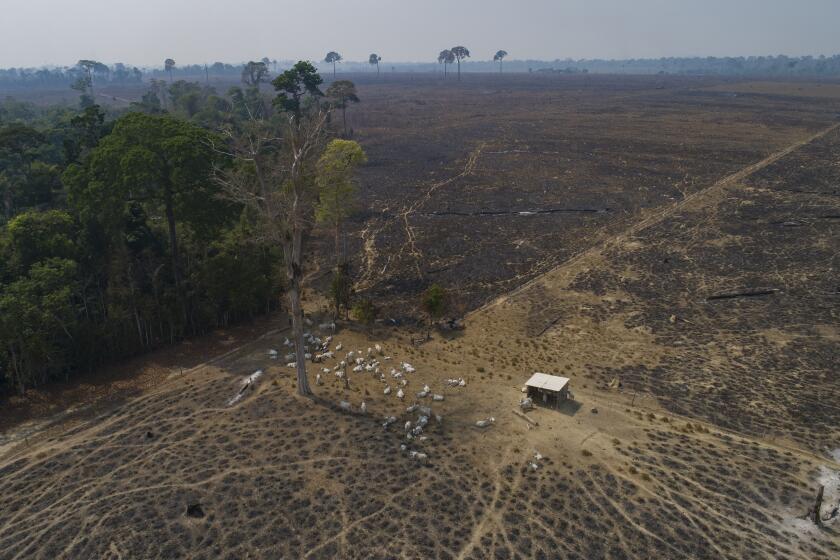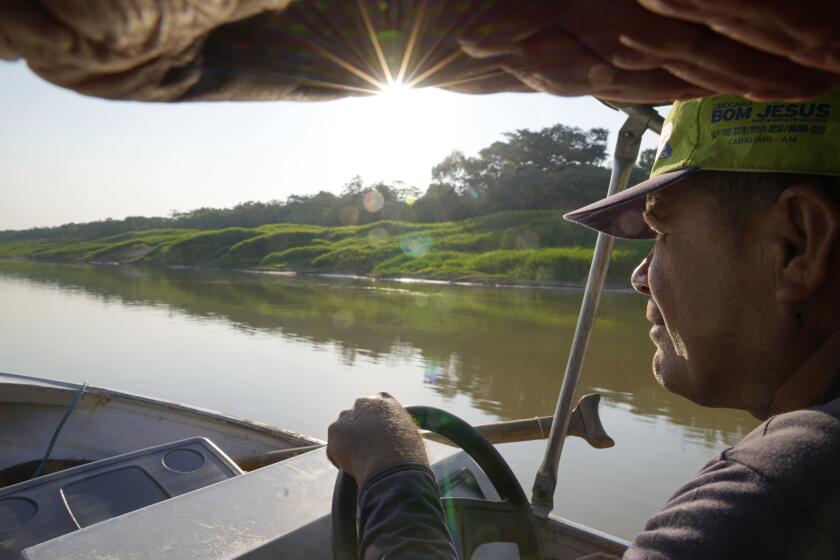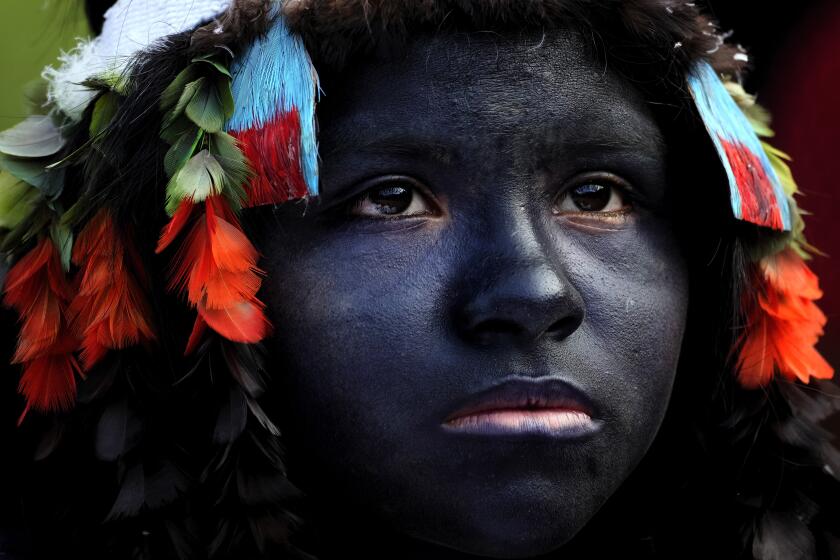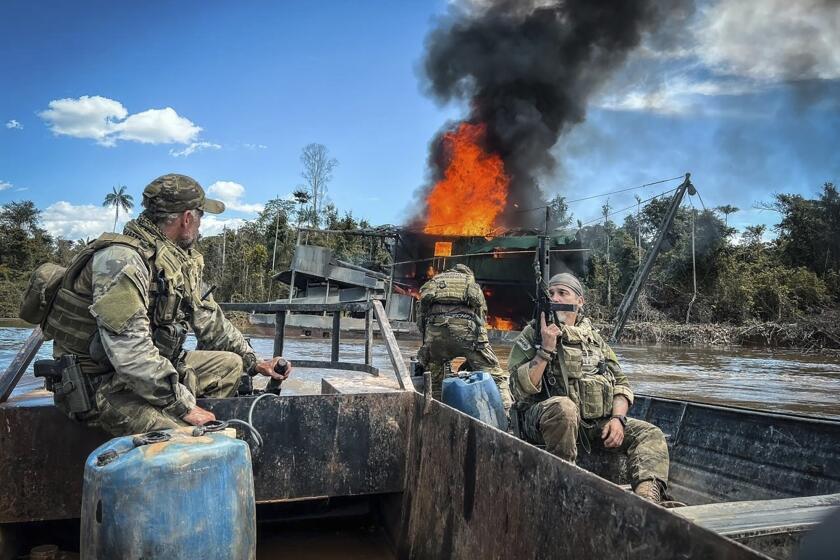Brazil leader hopes Amazon summit will bring back protections that the world needs
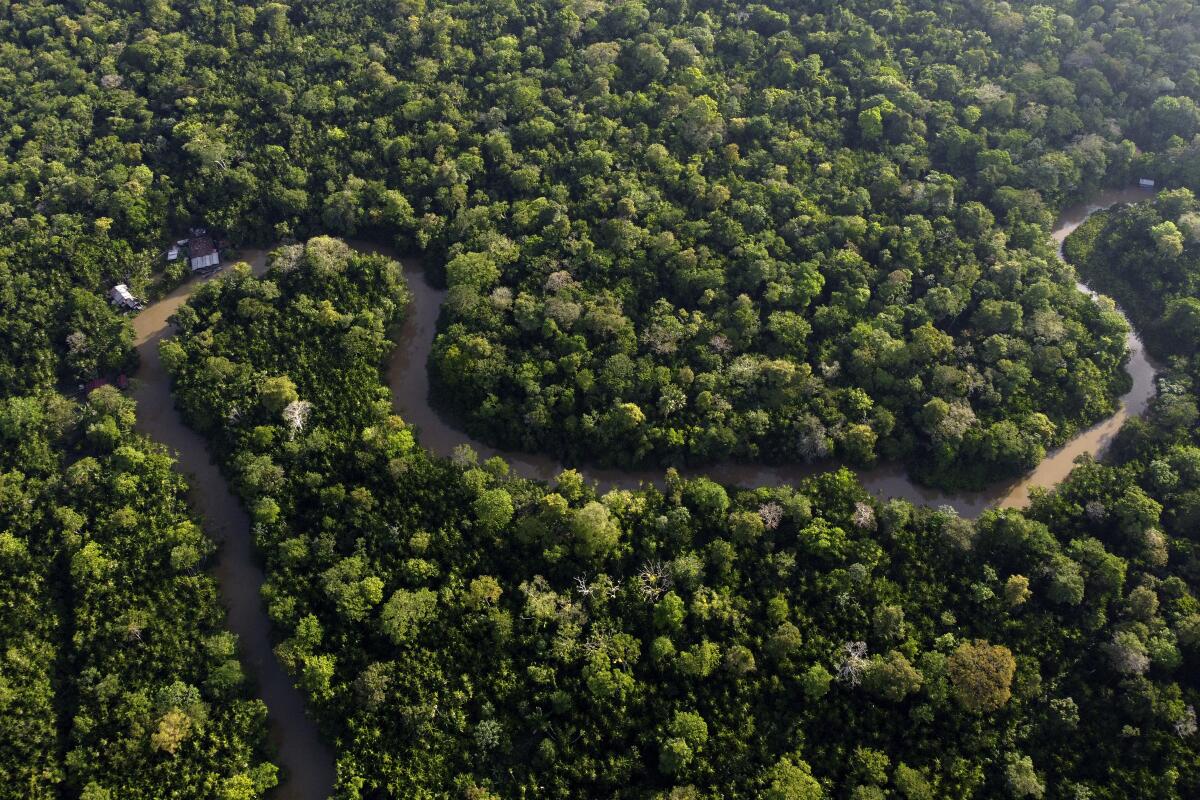
- Share via
BELEM, Brazil — Amazon rainforest nation leaders met Tuesday for the first time in 14 years to find common ground on fueling economic development while protecting an ecosystem vital to the battle against climate change.
Assembling Tuesday and Wednesday in the Brazilian city of Belem are members of the Amazon Cooperation Treaty Organization, a 45-year-old alliance that has met only three times before. Brazil’s President Luiz Inácio Lula da Silva has said that he hopes the summit will spur it to start taking far-reaching and effective action.
“It has never been so urgent to resume and expand that cooperation. The challenge of our era and the opportunities that arise will demand joint action,” Lula said at the start of the event on Tuesday morning.
The Amazon stretches across an area twice the size of India, and two-thirds of it lie in Brazil. Seven other countries and one territory share the remaining third. Presidents from Colombia, Peru and Bolivia are also attending, plus Guyana’s prime minister, Venezuela’s vice president and the foreign ministers of Suriname and Ecuador.
Massive destruction of the Amazon forest is a climate disaster and all the countries at the summit have ratified the Paris climate accord, which requires signatories to set targets for reducing greenhouse gas emissions. But that’s about as far as their shared policy goes.
Deforestation in Brazil’s Amazon rainforest dropped by one-third in the last six months since Luiz Inácio Lula da Silva became president again.
One issue on the agenda is organized crime in the Amazon. Few border areas are policed seriously and there has been scant international cooperation as rivals compete for drug-trafficking routes. Drug seizures have increased in Colombia, Brazil, Bolivia and Peru over the last decade, the United Nations Office on Drugs and Crime reported in June.
Homicide rates in Amazon municipalities are sometimes double or triple already-high national averages, said Rob Muggah, founder of the Igarape Institute, a security-focused think tank. Traffickers have diversified into businesses like “narco-deforestation” — laundering trafficking profits into land for agriculture — as well as financing and logistics for illegal gold prospecting that lays waste to the forest and poisons waterways, according to the UNODC report.
It’s Lula’s second attempt to form an Amazon bloc. He tried when the last Amazon summit was held in 2009, during his first presidency, but was joined by only one other president from the region, Bharrat Jagdeo of Guyana.
The event will also address how countries will prevent the Amazon from reaching a tipping point, in which the former forest releases carbon dioxide out of control. According to some scientists, this will happen when 20% to 25% of the forest is destroyed. The resulting decline in rainfall would transform more than half of the Amazon into a tropical savannah, with immense biodiversity loss.
A Brazilian nonprofit has created a new model for land ownership that welcomes local people and scientists to collaborate in preserving the Amazon.
Forest protection commitments so far have been uneven. Brazil and Colombia have pledged to stop deforestation completely by 2030, but other countries are reluctant to follow.
Notable goals include:
— BRAZIL: Lula has said he will create 14 new Indigenous territories, and has already created six. He also said he will restore Brazil’s official climate commitment — 37% lower emissions by 2025 than in 2005 — which was weakened under his predecessor. But it’s just a promise and has not been formalized.
— COLOMBIA: President Gustavo Petro’s government has laid out a 30-year strategy for reaching carbon neutrality by 2050, and reducing its greenhouse gases by 51%. He has sought to position himself as a leader in global climate efforts and protection of the Amazon.
— ECUADOR: President Guillermo Lasso has said that he will lead his country through an ecological transition to zero carbon emissions by 2050. By 2025, the nation aims to reduce deforestation to avoid 16.5 million tons of emissions. Ecuador also hopes to create a bio-corridor that allows animals to roam over distances, Foreign Minister Gustavo Manrique said this year.
— PERU: Peru is seeking not just a declaration aimed at slowing the collapse of the Amazon, but agreements to fight drug trafficking and other illegal activities.
The Indigenous adolescents danced in a circle under the thatched-roof hut from nearly dawn to dusk while parents looked on from the perimeter.
To face the threat the countries share from organized crime, Lula has already announced that Brazil will create a center for international police cooperation in Manaus, the largest city in the Amazon. The announcement underscored governments’ realization that isolated raids and crackdowns have been ineffective.
Cross-border cooperation in the Amazon also has historically been scant, undermined by low trust, ideological differences and the lack of government presence. Budding environmental consciousness and widespread recognition of the Amazon’s importance in arresting climate change has invigorated the drive for a paradigm shift.
In 2018, Latin American nations signed the Escazu Agreement, which established the public’s right to environmental information and participation in decision-making, and protected environmentalists. However, several countries, including Brazil, have not yet ratified it. The following year, they signed the Leticia Pact to better coordinate environmental protection.
Lula said he hopes a “Belem Declaration” — already drafted — will become the nations’ shared call to arms as they move toward the global climate conference in November in Dubai.
This summit also reinforces Lula’s strategy to leverage global concern for the Amazon’s preservation. Emboldened by a 42% drop in deforestation during his first seven months in office, he has sought international financial support for forest protection. The leaders of Norway and Germany, large contributors to Brazil’s Amazon Fund for sustainable development, were invited, as were counterparts from other crucial rainforest regions: Indonesia, Republic of Congo and Democratic Republic of Congo. France’s ambassador to Brazil will attend, representing the Amazonian territory of French Guiana.
When Brazil’s environmental authority busted an illegal gold mine, they found something that is becoming common at such sites: a Starlink unit.
Outside the official summit, some 20,000 Indigenous people and others from different Amazon countries have held 400 parallel events. In hours-long sessions, they presented demands to ministers mostly from Brazil, but also Colombia, Peru and other countries. On Tuesday, they also delivered a summary of these discussions to assembled presidents and officials, including a proposal that governments commit to preserving at least 80% of the Amazon.
“I had never seen a meeting so big to discuss the preparation for a COP,” rubber-tapper leader Manoel Cunha, 55, told the AP, noting that even at major events ministers are usually thin on the ground.
Asked whether he was optimistic about concrete decisions and action coming from the summit, renowned Indigenous leader Raoni Metuktire told the AP he intends to speak with presidents and make clear they effectively have no choice.
“They have to make this deforestation stop. What I am going to say is that if the presidents do not take any measure, they are going to have serious environmental problems,” he said Monday through an intepreter, speaking his native Kayapo language at an Indigenous emcampment. “Natural disasters will be a problem for all us human beings.”
AP writer Carla Bridi contributed from Brasilia, Paola Flores from La Paz, Gonzalo Solano from Quito, Franklin Briceño from Lima, Manuel Rueda from Bogota, and Jorge Rueda and Regina Garcia Cano from Caracas.
More to Read
Sign up for Essential California
The most important California stories and recommendations in your inbox every morning.
You may occasionally receive promotional content from the Los Angeles Times.
